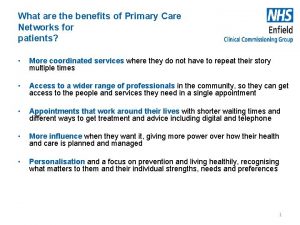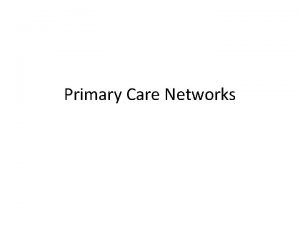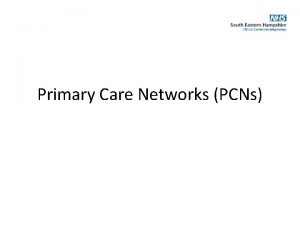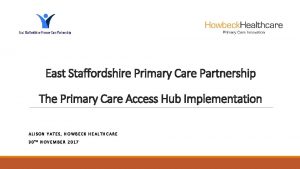Primary Care Networks Working in Partnership with People








- Slides: 8

Primary Care Networks: Working in Partnership with People and Communities Olivia Butterworth, Head of Public Participation, NHS England 27 th February 2019 www. england. nhs. uk

Overview • ‘Public participation’ or ‘engagement’ is about including local people as part of decision-making, and is different to involving individuals in decisions about their own care. • ‘Working in partnership with people and communities’ means going further than involving people in ‘one off’ engagement or consultation exercises, and instead having an ongoing dialogue with the local community: co-creation of services and support. • PCNs should aim to develop a ‘business as usual’ approach of working in partnership with their local community – ensuring that the views and experiences of local people influence all aspects of the design and delivery of care and they are co-created with people. www. england. nhs. uk 2

Why work in partnership with people and communities? • Local people often have solutions that would work better for their communities • Enabling people to have ‘ownership’ of their local services and support empowers them and is ‘health creating’ • Connects other community assets in to the local health family • Empowers communities to address health issues in sustainable ways • Builds greater understanding of local health services • These are their services that need to work for them www. england. nhs. uk 3

Practical steps • In order to establish a culture of working in partnership with people and communities, PCNs should consider: • Mapping and connecting with community assets, with VCSE organisations, local Healthwatch, GP Practice PPGs and other patient groups. • Taking an ‘assets based’ or partnership approach, recognising that everyone has something to contribute and exploring shared solutions to identified issues. • Ensuring that engagement activities include those who do not regularly access services, including those from ‘seldom heard’ groups and those that experience health inequalities. • Embedding patient, carer and public views as part of governance or decision-making structures, as well as undertaking wider work to capture views, for example through focus groups. • Identifying resources to support effective and meaningful involvement. This should support the approaches developed to support social prescribing. www. england. nhs. uk 4

Considerations / principles • Some useful principles to consider when working in partnership with people and communities include: • Start by asking what people want and what support they might need – they can own it. • Involvement is messy and organic – develop it with people • Building on what already exists, including activities, infrastructure and insight. • Get local people involved at the earliest stage and maintain an ongoing conversation – feedback, what’s happening and what next. • Being open and honest with people, including about what you don’t know, and the ‘tricky issues’. • Using community spaces (libraries, community cafes, community centres etc. ) can be more accessible for some people. • Valuing people’s time and input. www. england. nhs. uk 5

Resources and support • Wide range of (free) resources on the NHS England Involvement Hub (www. england. nhs. uk/participation), including: • Statutory guidance for CCGs and NHS England on involving people in health and care; • Good practice examples and case studies; • Resources, including Bitesized Guides, NHS England policies (for example on working with patient / public partners and reimbursing expenses), and templates. • Training offer, including free-to-access online courses on topics such as using social media to engage and developing excellent relationships with patient / public partners. • Rolling cycle of webinars – with bespoke series aimed at PCNs coming soon (tell us what would help you). • ‘Future NHS’ shared workspace for system transformation – PCN area to be available shortly. www. england. nhs. uk 6

Q&A and Discussion 1. What would you find useful to support your PCN to work in partnership with people and communities? 2. What do you see as the main challenges and opportunities? 3. Have you got any examples of where this is working already to share with others? www. england. nhs. uk 7

Contact us • Olivia Butterworth oliviabutterworth@nhs. net • Rosie Ayub rosie. ayub@nhs. net • Sarah Marsay sarah. marsay@nhs. net www. england. nhs. uk 8















